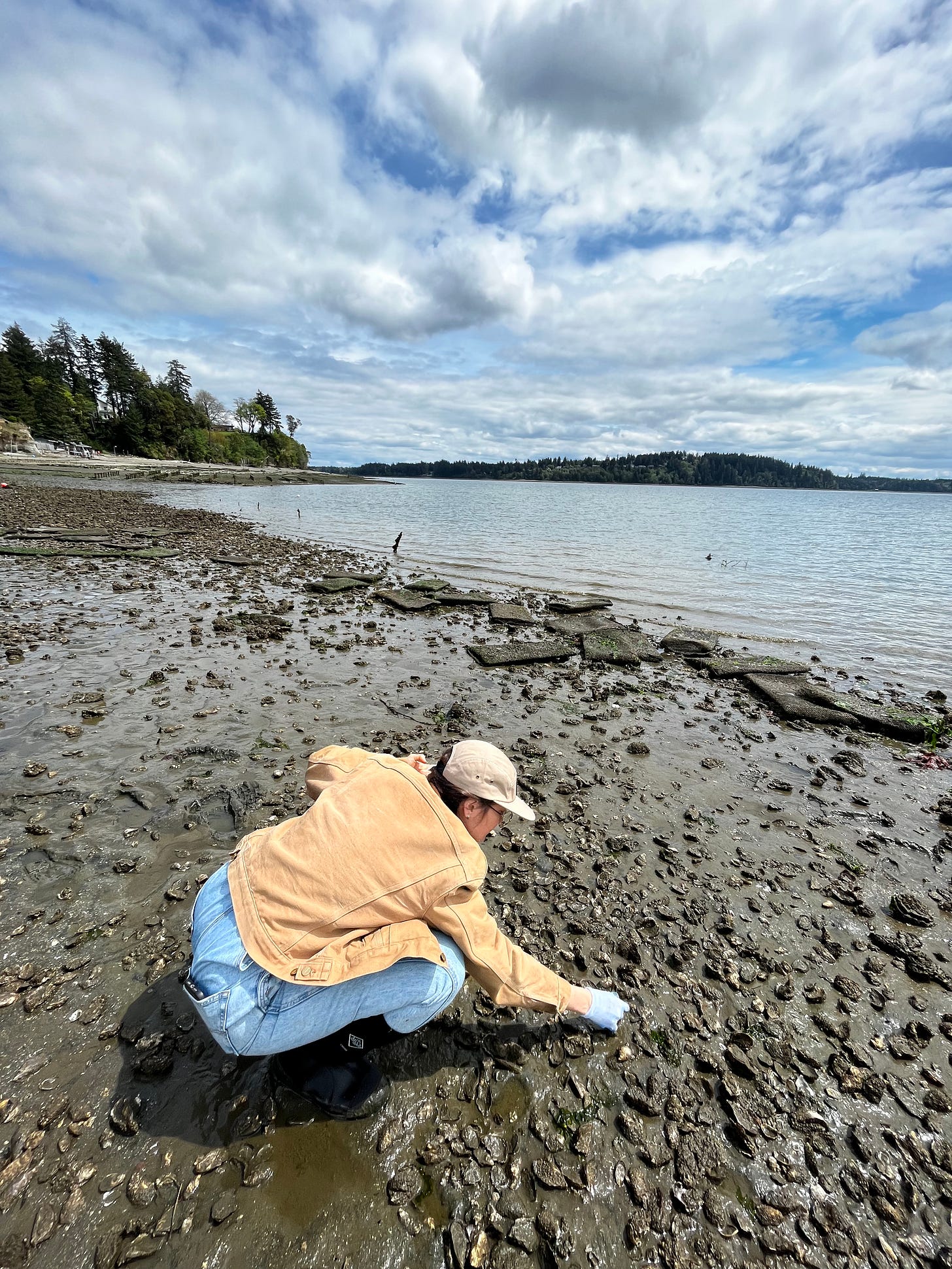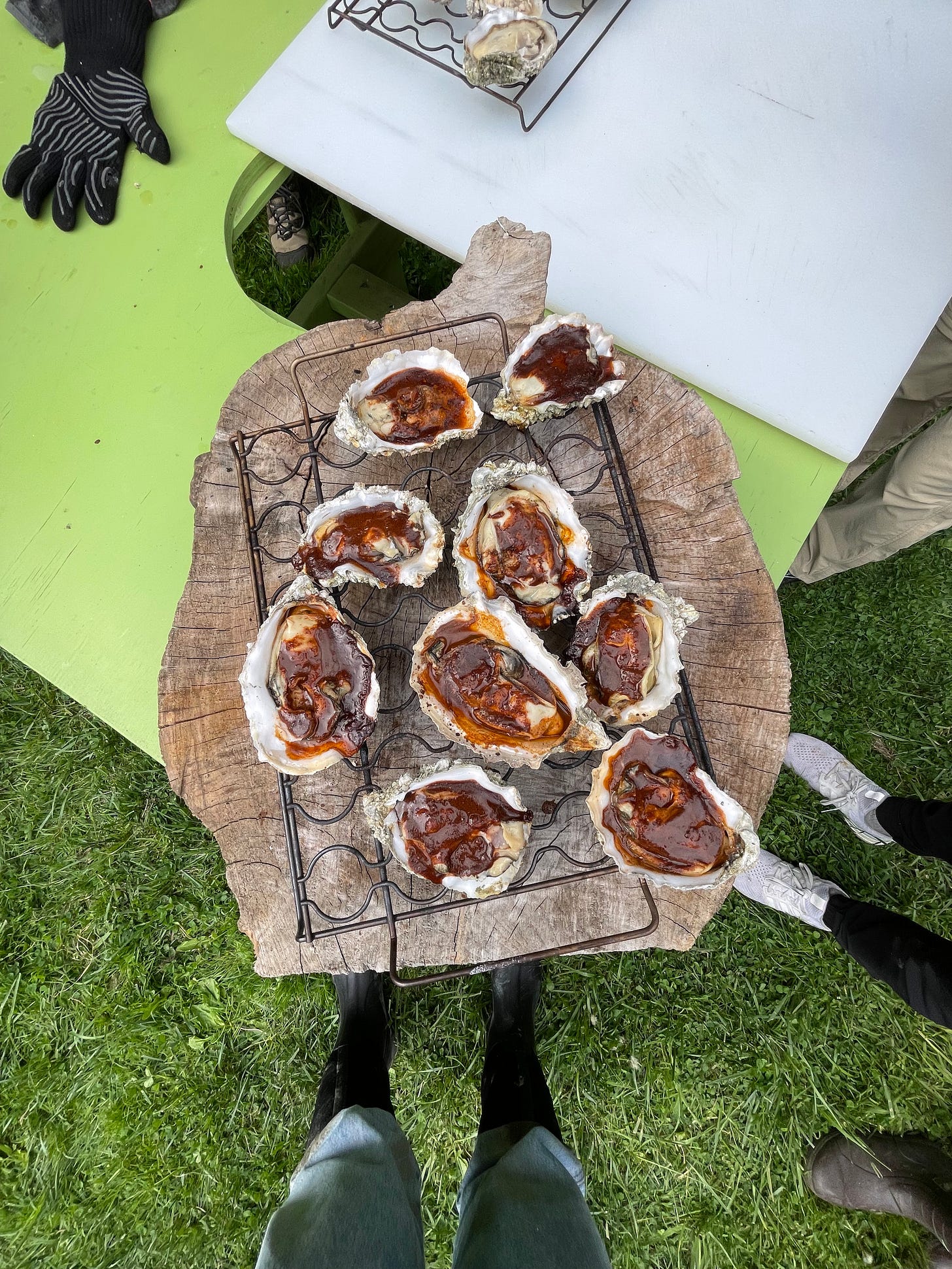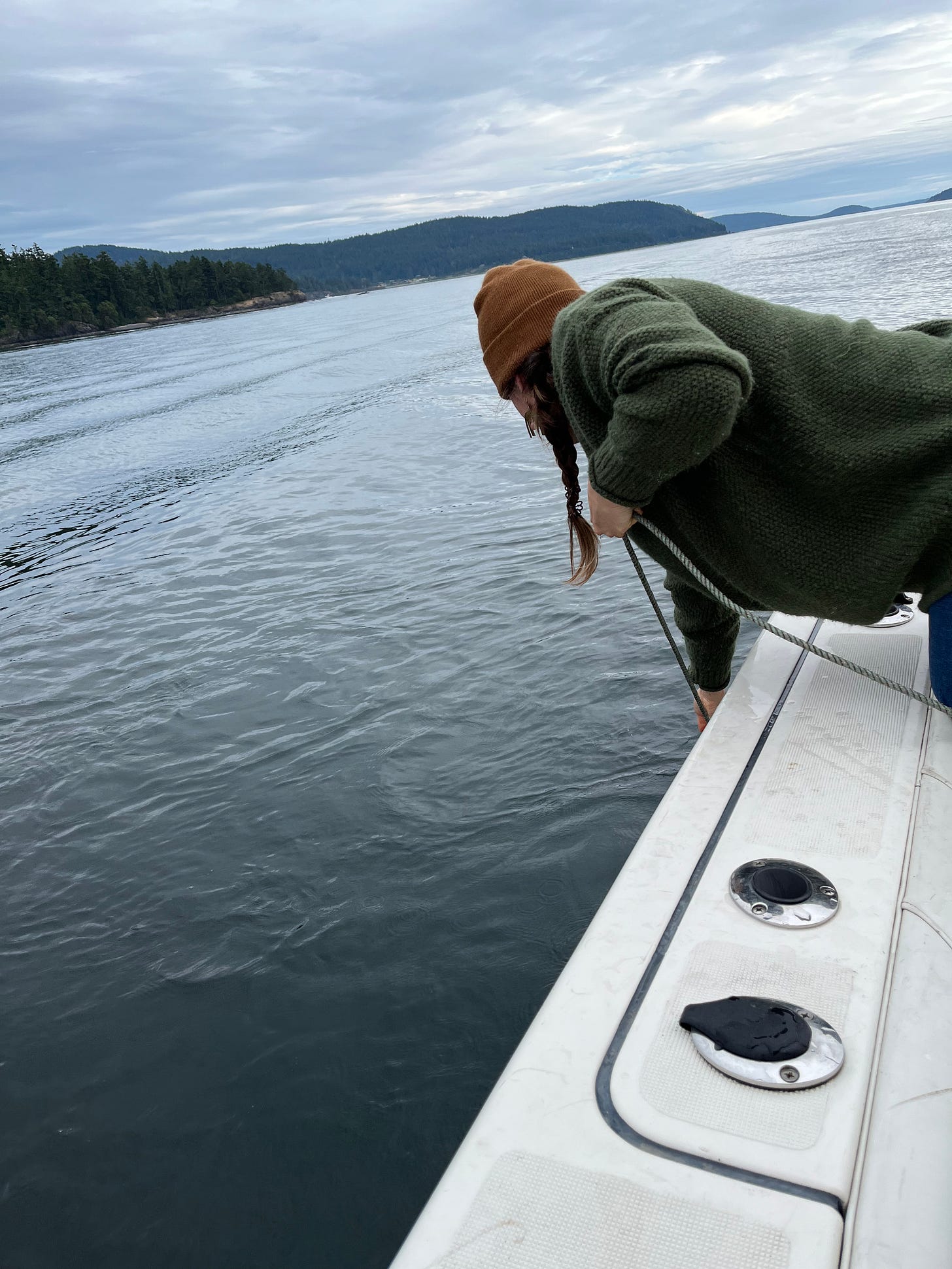plenty
unlearning scarcity
We recently went shellfish foraging and were careful not to exceed our limit - 40 clams and 18 oysters a piece.
Oh, what a feast!
We shucked some of the Olympia oysters fresh right there, drizzling them with a zesty champagne mignonette I’d just been taught to make. Slurping them out of their shells, we moaned in a chorus of indulgent appreciation.
For the clams, we made a Thai red curry and a piping hot Italian medley with tomatoes and chorizo.
For the larger oysters, we grilled them open-faced and slathered them with a secret-family-recipe mole sauce that was rich and heavy with warming spices.
As we drove home and the sunset at our back, we quickly realized we needed to rally a dinner party to help us eat the rest of our haul.
We urgently texted several friends to join us for dinner in a couple evenings, and everyone who could join us reveled in another abundant and filling feast!
We still didn’t finish everything.
I was left with a large butter Clam and two large Oysters that I had hoped to make into Cascadian variations of a po’boy sandwich.
Another couple of days went by. I still hadn’t cooked them.
I looked into the fridge to see the Butter Clam limply wasting away.
I felt something I don’t often feel.
Dishonorable.
I had taken this Wild Creature from her* home where she was contributing to a larger, intricate, abundant ecosystem and here she was, her siphon hanging pathetically from her shell, too weak to retract it. Starving. Dying of thirst.
I couldn’t stomach it. I gather her up alongside her Oyster companions, climbed into the car, and drove 20 minutes to the closest saltwater beach.
It was a poor attempt at repair for the mistake I’d made.
I warred with thoughts of “being so dramatic” about “just a clam”, while also worrying that it was too late to save her. Would the salinity at this beach be too dense? Too diluted?
I comforted myself that if it was too late, it was better for her to be back in the Salish Sea where her Body could feed more Life than ending up in my compost bin which gets trucked off to a massive processing facility - a system that is better than nothing but still contributes to an earth-suffocating cycle that hemorrhages pollution.
Going to Robin Wall Kimmerer’s lecture softened my insecurities about being so intense about “such a small thing” and “wasting 40 minutes on a workday” to feebly attempt to reduce the harm I’d caused.
In fact, she helped me see that this kind of attention is the exact mindset that our Planet, our Land, and our very own Lives require in order to learn what we need to learn to save not only ourselves but everyone we’ve so selfishly sacrificed on the altar of convenience and profitability and at the expense of our integrity/ethics/soul.
I look back at our foraging expedition, with deep appreciation and pleasure, as well as an honest and more honorable, new lesson in hand.
It is a violent and colonial mindset to take as much as possible simply because you can.
Without thinking we harvested as much as we were legally allowed, guided more by a desire “not to be fined” than any presence of mind. We outsourced the responsibility of decision-making and critical thought.
It’s not just unsustainable.
It’s dishonorable.
It’s extractive, shortsighted, and not even a very interesting way to think!
We know this deep down in the history remembered in our bones.
What if instead, we’d gone within and asked “what harvest would be honorable for everyone involved - the Land, our beyond-human Neighbors and Relatives, Ourselves, and future generations?”
The answer comes easily.
We could easily have taken half of what we harvested and had just as abundant of an experience. Held in the arms of Earth’s inherently, bountiful offerings, we would still have left full, grateful, and aglow with plenty.
What do we actually need to thrive? Harvesting that and leaving the rest to thrive, is sustainable.
When confronted with questions of how to reconcile preserving our Earth and surviving, Kimmerer always refers back to the wisdom of nature, since it has been successfully circulating Life for hundreds of millions of years.
“Reciprocity.” She encourages with impassioned gentleness.
We must pay attention and learn to give back.
What can we give back?
Physically: Bones and biomatter. Leave shells and fish heads where you harvested them from. Compost. Start a worm bin and shrink the loop to decompose your organic refuse and return it as a gift of nutrients and thanks to your patch of Land. We can grow our own gardens and turn them into regenerative pockets that feed our families and neighbors (human and animal), and that provide havens for us all. We can learn to see the world through the eyes of pollinators - replace our lawns with flowering ground cover, host and maintain Bee hotels, provide nectar to Hummingbirds, and reintroduce native blooms for Butterflies. We can notice when the Juncos are nesting in the bush and use that part of the yard a little less so that they feel safer to teach their new chick how to fly.
Socially: We can be the oddballs who make everyone uncomfortable by asking folks to slow down and give thanks before taking and consuming what the Earth so generously provides to us as food. We can invite people into our homes to break bread and model reciprocal practices. We can up-cycle and re-give presents, we can invest more in the second-hand economy (instead of Amazon and fast fashion), and learn to love slower consumption. We can mend and repair our belongings instead of throwing things away after they’ve given us so many hours of service and use. We can teach our housemates, families, guests, and neighbors about easy ways to steward simply by weaving it into our own lives. I’ve noticed that people ask me lots of questions and start to feel inspired themselves because they realize it isn’t as hard as it seemed.
Politically: We can vote. We can boycott companies that are decimating the planet and acting like there is a Planet B (mostly to cut their CEOS 7- and 8-figure payouts). We can support organizations on the front lines with money, letters of encouragement, building awareness, and contributions of our time. We can volunteer and advocate. Most importantly we can lift up indigenous leaders and tribes into positions of power to guide our Land stewardship practice as the most qualified leaders we have. They have a track record of thousands of years of successful, sustainable earth stewardship. All of the answers exist, we just need to turn our ears and hearts in the right direction.
Spiritually: We can give thanks. We can slow down. We can pay attention. We can occupy less space and we can choose inconvenient acts of care over convenient inaction and neglect. We can invest our hearts in preserving our home for our Neighbors - We can recognize that where we live isn’t just ours.
There are many others that call the same patch of Earth you live home and who need it just as much as we do - the Bunnies, the Juncos, the Bees, the Hummingbirds, the Apple Tree, the Forsythia, the Irises and Peonies and Daffodils, the Mallard, the Geese, the Squirrels, the Crows, the Heron, the Osprey, the Swallows, the Raccoons, the Coyotes, the Possum.
Dive Deeper I:
Ways I am weaving this idea of reciprocity into my everyday life:
Giving thanks before meals to the Beings that have given their lives to sustain mine so that I can remember that it is a gift and an exchange that becomes much richer with reverence. To the Land, Lives, Labor, and Love
A commitment to always taking less than my allotted harvest limit as a way to practice unlearning the soulless, extractive, hoarding mindset of the colonizer legacy.
When I harvest, asking permission from my Beyond-Human Relatives to harvest them and see what that practice reveals. To see if I know how to perceive their consent. To learn how if I do not.
I adopted pollinator bees from a local company and I put their home in a protected place on our porch. I provided them with a place to live, a hole of clay to make their nests, and a bee bar so that they have a consistent source of water on hot, dry days.
Before I planted a vegetable and flower garden, I spent many hours removing English Ivy and amending the soil with compost and organic matter that will take a few years to decompose - so that the Mycelium, Worms, Microbes, and subterranean Salamander might have a rich, healthy place to call home as they help my chosen Plants to flourish.
What would you add?
Dive Deeper Part II:
*At her lecture at the University of Washington last month, Robin Wall Kimmerer talked about how we use the pronoun “it” for non-human beings and it turns them into things, rather than living creatures who play essential, important, and interesting roles in the life and vitality of an entire world.
I’m aware that clams are hermaphrodites, but I wanted you, as my reader, to feel and see her aliveness. To see her as a Being that does not exist as an afterthought to our experience, but deserving of dignity small and large.
Kimmerer proposes the pronoun of “ki” (singular) and “kin” (plural) which comes from an Anishinaabe language root meaning “being of the living”.
I want to embrace language evolution, and I plan to interplay humanized pronounces as well to practice flexibility in my language and thinking.
Little Gifts:
I’ve been taking classes with the Tilth Alliance here in Seattle - I’ve learned about gardening for wild pollinators, vermiculture, hugelkultur, soil ecology, and so much more. I love their one-off workshops. They are affordable and I leave feeling inspired and more confident in my plantscapades!
The shellfish foraging expedition was organized by the Field Trip Society. I’ve mentioned them before and they host wonderful adventures.
My Hummingbird neighbors have discovered the sugar nectar I put out for them. I love the whir of their invisible wings and their unique chirps. Like a quiet version of the laser sound from science fiction movies. Have you ever looked at the world through the eyes of pollinators? You’ll notice things humans tend not to.
This song has been on repeat for the last couple of weeks:
Invitations:
Please share this newsletter far and wide! Repost it. Quote it. Email it. Screen shot and share… If you like essays like this, helping new readers find it is the surest way to help it stay alive and grow.
If you have any questions - how to slow down more, how I go about finding the adventures I do, my mindset behind balancing activism and pleasure, etc. - share them in the comment section below and I will answer them.





